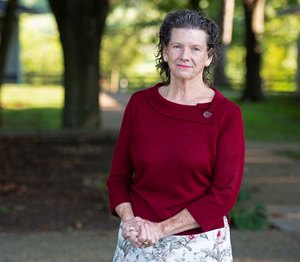Scollay's Tour of Racetracks Stops at Arapahoe Park


Imagine Johnny Cash singing about having traveled every road in this here land, but with racetrack names instead of towns, and you've got a taste of Dr. Mary Scollay's life for the past eight months.
"I've been to Belmont, Ruidoso, Thistledown, Arapahoe,
Will Rogers, Mahoning Valley, Prairie Meadows, Emerald
Of travel I've had my share, man
I've been everywhere, man."
As chief of science for the Horseracing Integrity and Welfare Unit (HIWU), which assumed oversight of medication testing and enforcement for most of the country May 22, Dr. Scollay has been on a barnstorming tour to 26 tracks and counting, preaching compliance to anyone who will show up to hear her message.
Horsemen, track staff, regulators, and private vets all have obligations under the new Anti-Doping and Medication Control rules and regulations, and Scollay wants everyone with a question to have a chance to ask it. The size or perceived significance of the venue is irrelevant, as all are theoretically equal under federal regulations and justice is theoretically blind to your stable size or earnings.
"One racetrack at a time," Scollay said after a June 9 meeting at Arapahoe Park near Denver. "It's really important meeting people face to face whenever possible. And it's been fun because every place I go, I see somebody that I know that I haven't seen in a long time."
Scollay's appearance at Arapahoe was timed to precede the first day of entries for a meet that opens June 17. The gathering attracted about 60 guests, mostly horsemen, but also stewards, track executives, state vets, private vets, test barn staff, and others who are concerned and/or confused about how the ADMC rules impact their day-to-day operations.

"We want it to be a successful transition," Scollay said. "We want the horsemen to be able to succeed under the new rules. Largely the rest of the world races under them. Change can be challenging but, by and large, everybody I've met has said, 'OK, tell me what I need to do and I will do it.' "
Now that the rules are in effect and being enforced, the prevailing attitude among horsemen has shifted from resistance to acceptance, Scollay said, even if it is begrudging acceptance. Whether they agree with or support a lot of the rules is another question entirely, but as long as they're here it is best not to get sideways with the law.
"They've been upset at times but it's genuine," Scollay said. "They've been polite to me and I've never felt hostility. I think initially there were people who didn't believe it was going to happen, so maybe they didn't really take home what they should have from the meetings. In more recent weeks, clearly, people are like, 'OK, we've got to get this.'
"Even organizations that have been opposed to the regulations have said to their constituents, look, we oppose this, and we are going to keep fighting it, but in the meantime, you need to listen, and you need to learn because these are going to be the rules until they're not the rules, if that time ever comes. That's been really helpful for them to say, look, we don't agree with it, but it's here, and now it's time to pay attention and ask your questions."
Scollay typically starts with a presentation that explains the structure of HIWU and the committees that establish the rules. The bulk of the time, though, is devoted to detailed information on the "dos and don'ts" of medication administration, with particular attention given to detection times and the voluminous lists of controlled and banned substances.
A version of Scollay's presentation can be found online here.
"First and foremost, our job right now is education," Scollay said, encouraging the audience to ask questions and even inviting them to text her images of supplements or medications if they are unsure about their permissibility. It's a lot easier to answer a question on the front end, Scollay tells them, than to deal with adjudicating a positive test after it's too late.
"Every place I've been, somebody's come up and said, 'We're different here.' And that they may be; they're all unique places. But there shouldn't be concessions because we're different. That's where the uniformity falls apart, and at the end of the day it's about the uniformity. Everybody's got to bend a little bit. Nobody gets everything they want and, hopefully, nobody gets stuck with nothing they want. We're all going to learn together."
